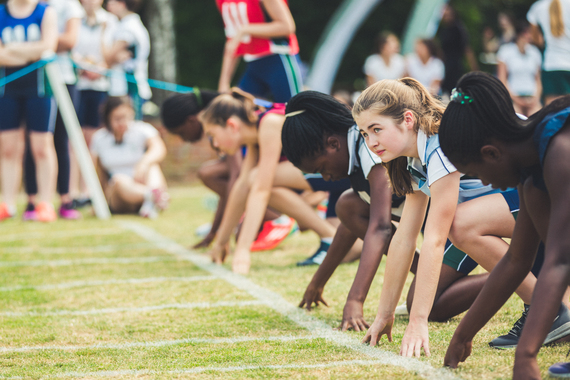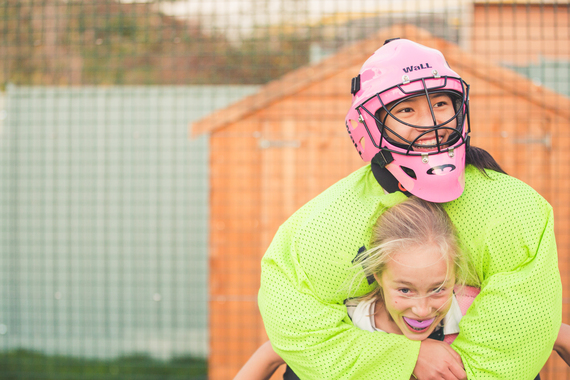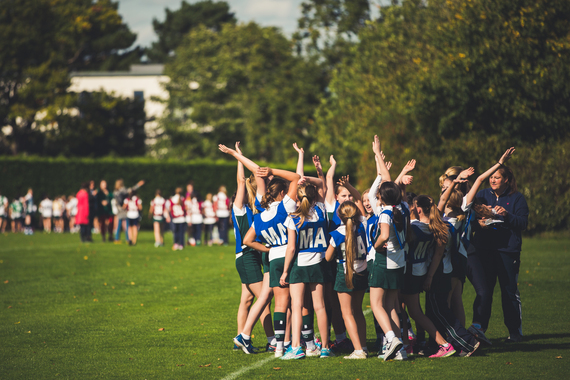Link: http://www.huffingtonpost.co.uk/eve-jardineyoung/girls-in-sport-time-to-le_b_18366314.html
Sport England’s Active People Survey suggests that almost 230,000 more people played sport weekly in 2016 than in 2015, an encouraging trend. However, they also reported that two million fewer women play sport regularly than men aged 14-40, even though 75% of them would like to be more active. Low self-esteem and self-consciousness have been identified as factors influencing why girls drop out of playing sport at twice the rate of boys before adulthood. Myths and clichés relating to female participation in sport pervade and, if underlying attitudes remain unchallenged, they can become self-fulfilling prophecies. We must work together to positively counter the expectation that girls’ sporting participation is unrewarding, difficult, anti-climactic, or embarrassing if they fail at the first hurdle. Photograph courtesy of Cheltenham Ladies’ CollegeMyth: “Girls aren’t as ‘sporty’ as boys”
With women’s sport making up just 7% of all UK sports media coverage, we have a way to go before our children benefit from the inspiration provided by an equal level of male and female sporting role models.
It is striking that this year only eight female athletes made the ESPN’s 100 World Fame list and just one, the formidable Serena Williams, made the Forbes 100 Highest Paid.
While fame and fortune are not the ultimate accolades, for many male athletes global recognition, higher pay and sponsorship deals naturally flow from sporting success. Younger generations are deluged with reports and images celebrating their male athletic heroes. This impacts participation at every level, as their legacy is to fuel love and admiration for their sport regardless of ability and increase participation from the grass roots up, not simply to inspire more elite and professional athletes.
We must enable more girls to feel as inspired by sport and fitness from a young age, to ensure that they come to see participation as the norm for a healthy lifestyle.
As we allow our girls the freedom to find out what works for them, as teachers and parents we must collectively work towards redefining what it means to be ‘sporty’. Whether football, hula hooping or martial arts, we must encourage self-expression, confidence and passion for sport and fitness, both in team sports but also as individuals.
Photograph courtesy of Cheltenham Ladies’ CollegeMyth: “Girls aren’t as ‘sporty’ as boys”
With women’s sport making up just 7% of all UK sports media coverage, we have a way to go before our children benefit from the inspiration provided by an equal level of male and female sporting role models.
It is striking that this year only eight female athletes made the ESPN’s 100 World Fame list and just one, the formidable Serena Williams, made the Forbes 100 Highest Paid.
While fame and fortune are not the ultimate accolades, for many male athletes global recognition, higher pay and sponsorship deals naturally flow from sporting success. Younger generations are deluged with reports and images celebrating their male athletic heroes. This impacts participation at every level, as their legacy is to fuel love and admiration for their sport regardless of ability and increase participation from the grass roots up, not simply to inspire more elite and professional athletes.
We must enable more girls to feel as inspired by sport and fitness from a young age, to ensure that they come to see participation as the norm for a healthy lifestyle.
As we allow our girls the freedom to find out what works for them, as teachers and parents we must collectively work towards redefining what it means to be ‘sporty’. Whether football, hula hooping or martial arts, we must encourage self-expression, confidence and passion for sport and fitness, both in team sports but also as individuals.
 Photograph courtesy of Cheltenham Ladies’ CollegeMyth: “Women’s sports aren’t as exciting to watch”
From the 16.3 million people who watched Jessica Ennis-Hill win her Heptathlon gold, in the fifth most popular 2012 Olympic event, to the 7.4m viewers gripped by Konta and Halep’s quarter-final, the most watched Wimbledon Ladies’ match on BBC record, events in recent years have started to diminish the argument that women’s sports are not exciting.
Visibility and recognition of women’s sporting achievements are gradually increasing. For the next generation, we need to dispel what remains of this myth and use these shining examples to emphasise the engaging and empowering nature of sport, regardless of gender.
Photograph courtesy of Cheltenham Ladies’ CollegeMyth: “Women’s sports aren’t as exciting to watch”
From the 16.3 million people who watched Jessica Ennis-Hill win her Heptathlon gold, in the fifth most popular 2012 Olympic event, to the 7.4m viewers gripped by Konta and Halep’s quarter-final, the most watched Wimbledon Ladies’ match on BBC record, events in recent years have started to diminish the argument that women’s sports are not exciting.
Visibility and recognition of women’s sporting achievements are gradually increasing. For the next generation, we need to dispel what remains of this myth and use these shining examples to emphasise the engaging and empowering nature of sport, regardless of gender.
 Photograph courtesy of Cheltenham Ladies’ CollegeMyth: “Girls aren’t competitive enough”
In recent Olympics, it has been very encouraging to see more countries supporting female participation, with some sportswomen wearing national colours in certain disciplines for the very first time. The Summer and Winter Olympics will see an unprecedented 57 sports represented, showcasing some of the diverse achievements of our most dedicated athletes and just a few of the hundreds of sports and activities, from boxercise to yoga, that enhance children’s mental and physical wellbeing.
Some of our girls compete fiercely against strong fields in national competitions while others focus on improving their personal bests. However, for each of us, challenge and reward mean something different and these warrior-like mental qualities are not essential for success, empowerment, and building confidence through sport.
Presenting children with support, choice and opportunity is crucial in enabling them to enjoy exercise and find their niche. Ultimately, if we tackle the many persistent myths around women in sport, then we encourage girls not only to enjoy lifelong participation, but also to benefit from the confidence, resilience and camaraderie that comes with it.
Photograph courtesy of Cheltenham Ladies’ CollegeMyth: “Girls aren’t competitive enough”
In recent Olympics, it has been very encouraging to see more countries supporting female participation, with some sportswomen wearing national colours in certain disciplines for the very first time. The Summer and Winter Olympics will see an unprecedented 57 sports represented, showcasing some of the diverse achievements of our most dedicated athletes and just a few of the hundreds of sports and activities, from boxercise to yoga, that enhance children’s mental and physical wellbeing.
Some of our girls compete fiercely against strong fields in national competitions while others focus on improving their personal bests. However, for each of us, challenge and reward mean something different and these warrior-like mental qualities are not essential for success, empowerment, and building confidence through sport.
Presenting children with support, choice and opportunity is crucial in enabling them to enjoy exercise and find their niche. Ultimately, if we tackle the many persistent myths around women in sport, then we encourage girls not only to enjoy lifelong participation, but also to benefit from the confidence, resilience and camaraderie that comes with it.
 Photograph courtesy of Cheltenham Ladies’ College
Photograph courtesy of Cheltenham Ladies’ College